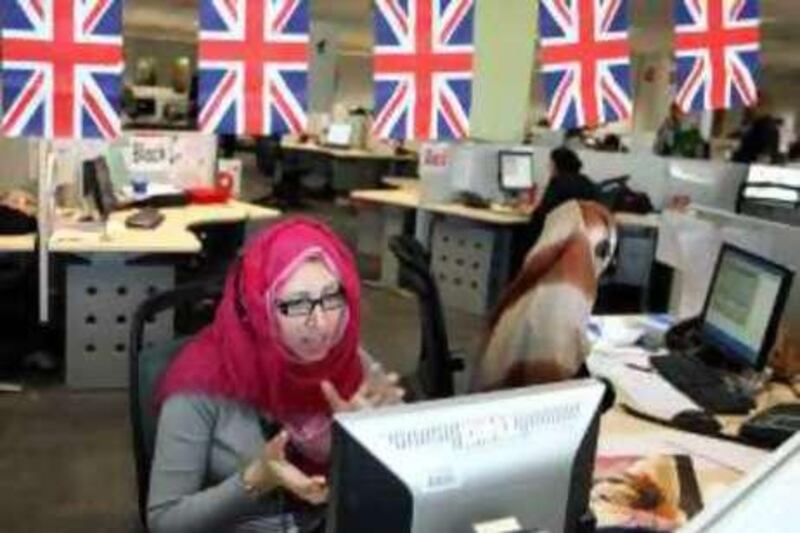A woman in the north of England has a problem with her telephone, and calls the company to find out what is wrong. Twenty years ago, she would have dialled a local office. A decade ago, her call would have made its way to a national call centre somewhere in the UK, or possibly Ireland. At the turn of the 21st century, it might have gone to India. But since the middle of last month, it is being redirected to Cairo. The city is emerging as a call-centre hub in a way few would have predicted during the 1990s when the country was in the grip of an Islamist rebellion and facing crumbling infrastructure and a collapsing economy.
Vodafone, the world's largest mobile phone network, is sending an increasing volume of its English-language customer-service calls to Egypt as the country fast becomes the outsourcing capital of the Arab world. By next March, more than 1,200 English-language customer-service operators will staff the Vodafone International Services (VIS) call centre in the Sixth of October city region of Cairo. Vodafone Egypt has been so successful in attracting offshore customer-service operations from its sister companies in Australia, New Zealand and the UK that it has launched a dedicated business that will target similar opportunities around world.
Until recently, VIS focused on serving internal Vodafone customers. But in an ambitious development that is the first of its kind for Vodafone globally, the company is now offering its services to external customers, both within and outside the telecommunications industry. "We started off outsourcing just in the call-centre arena, but we're going beyond that," said Denise D'ella, the director of VIS. The company will look for outsourcing deals targeting business processes such as human-resource management or data processing, as well as software development and maintenance.
The company will look to get the business of Vodafone's operation in Qatar, which will launch next year, and is also looking at the UAE telecommunications market. "We're also very interested in Dubai," said Shahinaz Ghazy, the head of international operations at VIS. "If [network operator] du would like to outsource any customer support or back-office activities, we're definitely interested in that."
Vodafone's move into the outsourcing industry comes as Egypt's government looks to create hundreds of thousands of jobs in information and communications technology. Smart Village, a technology-focused office park on Cairo's outskirts, is now home to 20,000 professionals, and a national plan hopes to see 50,000 more jobs by 2010. Call centres, which create large numbers of relatively low value-adding jobs, are a cornerstone of the employment aspect of the strategy.
A good call-centre job can pay more than 3,000 Egyptian pounds (Dh2,012) a month, a healthy amount in a country where many university graduates will work for a lifetime earning less than one third of that figure. The VIS call centre has a yearly staff turnover of 3 per cent, a low figure by global standards. Language is the key factor in determining the earning potential of a call-centre worker, with Egyptian graduates often fluent in at least one European language. Many have been taught in English from kindergarten to university and speak in an accent that reflects the typically British or US origins of their teachers. Call-centre professionals are more neutral and universally understandable than most others.
"We did a lot of research on this in the beginning, obviously we were really concerned originally about the accents," said Meg Collis, a Vodafone UK manager who is based in Cairo and is working on the outsourcing initiative. "We found our customers were not concerned about the accent as long as they got a resolve, and the articulation and clarity was there," she said. "There is a bit of a stigma around the Indian accent because of the historical experience customers have had with some call centres."
While call centres can create a high volume of jobs, higher-value outsourcing, such as software development or project management, creates less employment but generates far greater economic returns. Orange, the French telecommunications company, has almost 1,500 mainly technical staff working in its Cairo-based global service centre. Supporting the company's global corporate customer base, they resolve complex technology challenges for large enterprises.
The country is also home to research-and-development centres for global industry leaders such as IBM, Microsoft and Intel. A long-term goal is for Egypt to sit at "the middle-upper end of the value chain", said Amin Khaireldin, who develops the export strategy for the country's Information Technology Industry Development Agency (Itida). Itida, an industry body chaired by Egypt's minister for communications and information technology, is pushing for a government-wide approach to building the industry, including a boost in funding for education in languages and technology.
Eventually, the organisation hopes to see a sector strong and vital enough to no longer need a government-affiliated body to support its growth. "There is a clear indicator for the success of Itida," said Hazem Abdel Azim, its chief executive. "If Itida is successful, it will vanish." tgara@thenational.ae





